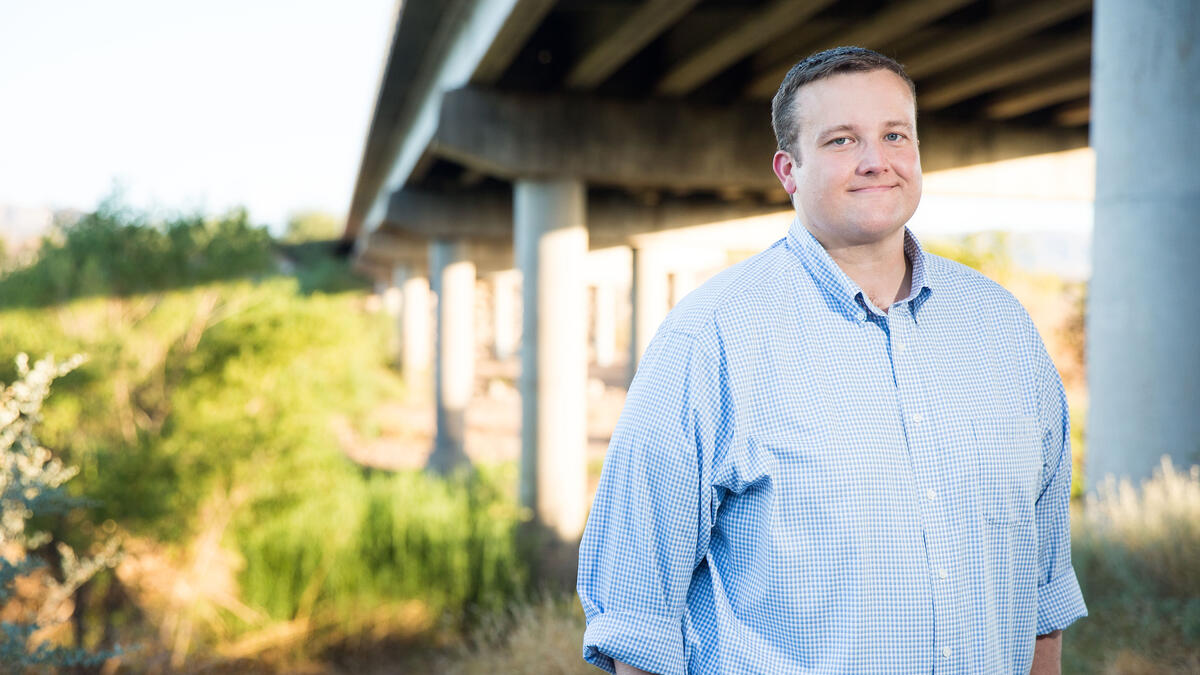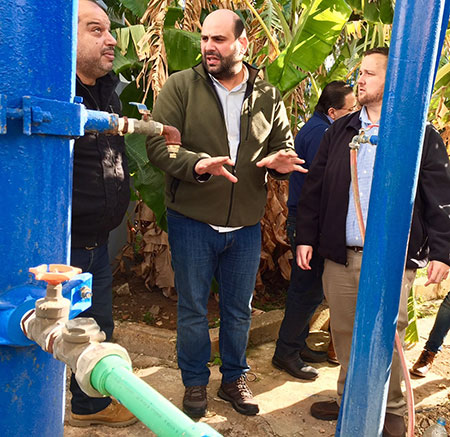ASU Law professor sees water project as part of solution for peace in Middle East

The ripple effects of Syria’s brutal civil war have been felt across the globe, and countries nearest to the epicenter are straining to accommodate a massive influx of refugees. In those areas, water is perhaps the most precious and threatened resource. That is why an Arizona State University-led team is working to bring lasting relief.
One year into a two-year, $1.95 million project to provide affordable sources of clean water throughout Jordan and Lebanon, a launch event to celebrate the installation of the first systems is scheduled for Oct. 13. Rhett Larson, an associate professor at the Sandra Day O'Connor College of Law and an expert on Middle East water issues, has played a leading role, along with Northern Arizona University Professor Richard Rushforth and ASU Polytechnic School Assistant Professor Nathan Johnson.
The project, funded by the United States Agency for International Development (USAID), involves an international mix of public and private partners: H2O for Humanity (Illinois), GreenCo Water (Australia), Mercy Corps (a global development organization), the René Moawad Foundation (Lebanon) and Zero Mass Water (Arizona).
At an initial brainstorming session, Larson brought up H2O for Humanity, which had been successful installing small, reverse-osmosis kiosks as sustainable business enterprises in India.
“I thought, well, if we could perhaps replicate what H2O for Humanity is doing in the Middle East context, particularly for refugee host communities in Lebanon and Jordan, perhaps this would be able to help alleviate some of the water stress in those communities,” he said. “I’ve worked on Middle East water issues and have a lot of friends and contacts there, so I thought perhaps we could connect these two things.”
Regional unrest
Using the technology and resources of all the partners, the consortium designed small-scale water systems that use reverse osmosis, or desalination, to avoid further depleting scarce groundwater supplies. The project, titled “A Holistic Water Solution for Underserved and Refugee Host Communities in Lebanon and Jordan,” has a target goal of providing water to 36,000 people in 18 communities.
Larson says the project is already providing water in some communities, but it has required adjustments as refugee numbers have swollen.
“We envisioned putting this in really small communities and more or less replicating what H2O for Humanity had been doing in India,” he said. “But the sheer number of refugees in these communities has forced us to look at larger wells and scaling up the system. So we had initially thought that we would have a lot of small treatment systems on a lot of small wells. And it looks like it may work out to be fewer numbers of wells, but much larger wells and larger communities.”
Although there are water needs throughout the world, the already-acute problems in the arid region have been exacerbated by the refugee crisis.
“Jordan and Lebanon are, by far, the two countries that have absorbed, on a per capita basis, the greatest number of Syrian refugees,” said Larson, who is also a senior research fellow with the Morrison Institute of Public Policy and sits on the advisory board of the institute’s Kyl Center for Water Policy. “The Lebanese people and the Jordanian people have been remarkably hospitable and generous to the Syrian refugees, but there’s a limit to that hospitality. They themselves are water-poor countries that struggle to manage that resource. And having that influx of people, it creates tensions, real tensions, between the host communities and the incoming refugees.”
Legal matters
Bringing water to distressed areas of the Middle East involves infrastructure, requiring expertise in science, sustainability and engineering. Less obvious, perhaps, are the myriad legal issues, ranging from the typical challenges of a startup enterprise to the complexities of Sharia lawSharia law is a set of guiding principles in the practice of Islam derived from the teachings of the Prophet Muhammad..
“There’s a lot of law involved in simply setting up these businesses and in establishing contractual relationships with customers and suppliers for these businesses,” Larson said. “So as with any other startup business, each one of these systems represents a new startup business and has all the same legal issues that any other startup business would have.”

Anthonio Moawad (center), project manager at the René Moawad Foundation, and ASU Law faculty Rhett Larson (right) discuss the water-quality details of a well under consideration in Qubbe, Lebanon, with a local utility expert (left). Photo by Ashley St. Thomas/ASU Walton Sustainability Solutions Initiatives
One focus of the project has been to create entrepreneurial opportunities, particularly for women, in operating the water systems. But ownership issues have complicated matters, because some of the wells are owned by municipalities, not the operators.
“We’ve had to be creative about how these entrepreneurs can make money when they aren’t the ones that necessarily own the well,” Larson said.
That creativity led to a surprising innovation: the monetization of wastewater.
“A big obstacle to reverse osmosis or desalination technology is there is a waste product at the end, and how to dispose of it,” Larson said. “These businesses are now selling it to construction sites to use in mixing concrete. We don’t need to have high-quality water to mix concrete, so you’re having construction sites that are buying the wastewater. So even our waste is generating money in at least some of our sites. That’s been really exciting.”
Navigating the legalities of water infrastructure in the Middle East may also require, in some instances, an understanding of Sharia law.
“Sharia has a water-rights component to it,” he said. “It has a right called shafa, which is the right to drink, and a right called shirb, which is the right to irrigate. And different communities may interpret those rights differently. Some will think that you can never charge for drinking water. And some will say, well, you can charge for drinking water if it’s a private water right, but not if it is a public water right. And some will say that you can charge for drinking water if it’s a public water right, but only to the extent that the person buying it from you can afford it.”
Neither the water systems of Jordan nor Lebanon are officially governed by Sharia law, but Larson says a related Ottoman civil code known as Majalla still has some influence.
“It isn’t the recognized water law, but it has some influence, particularly for some of the older water rights,” he said. “And in Jordan, you’ll have certain tribal water rights that are recognized that still have elements of Sharia law in them. So my long-term research interests are to be able to map and understand the way different communities are interpreting their understanding of Sharia law and shafa and shirb.”
Peace and prosperity through water
The roots of Syria’s civil war are tangled in global politics, religious strife, the authoritarian regime of President Bashar Assad, and the rise of ISIS. And perhaps the most overlooked factor: water.
“The reason that the Assad regime was destabilized is in part because there was a drought in the Euphrates River basin, and drought meant that crops failed and food prices went up and rural communities began moving into cities,” Larson said. “And when you have rural communities that are displaced, that can’t afford food, that lost their crops and they come into cities and they’re desperate, it’s dry kindling for radicalization and instability.”
And water is not only the essence of life, but, as Larson says, the key to peace and prosperity.
“If we want to be able to solve the problems of mass migrations and refugee issues in the world, if we want to address issues of instability, if we want to address issues like radicalization and terrorism, we should invest in water security,” he said. “People do what people have done for thousands of years: They look for water. And they might say that they’re looking for peace or prosperity, but peace and prosperity are functions of water security. Places that have water security tend to have peace and prosperity. Places that don’t, they tend to be unstable.”
He added, “If what we want is a world of safety, if what we want is to let people stay in their homes and feel safe, then investing in water security is really important. And what USAID in particular is doing is they are showing these refugees that the American people care about them, and that the American people are bringing them this most vital resource and they recognize how important this resource is to their long-term security and to the stability of their own communities and of their own nations.”
The project is a perfect fit for Larson, aligning with his interests and expertise in water, legal issues and the Middle East. More importantly, it allows him to pursue a bigger passion, underscored in his simple answer when asked why he got involved: “To help people.”
This study/report/website is made possible by the support of the American People through the United States Agency for International Development (USAID.) The contents of this study/report/website are the sole responsibility of Arizona State University and do not necessarily reflect the views of USAID or the United States government.
Top photo: ASU Associate Professor of law Rhett Larson is an expert on Middle East water issues. Photo by Deanna Dent/ASU Now
More Law, journalism and politics

TechTainment conference explores the crossroads of law, technology, entertainment
What protections do writers, actors, producers and others have from AI? Will changing laws around name, image and likeness (NIL) eliminate less lucrative college sports programs?And what does…

How to watch an election
Every election night, adrenaline pumps through newsrooms across the country as journalists take the pulse of democracy. We gathered three veteran reporters — each of them faculty at the Walter…
Law experts, students gather to celebrate ASU Indian Legal Program
Although she's achieved much in Washington, D.C., Mikaela Bledsoe Downes’ education is bringing her closer to her intended destination — returning home to the Winnebago tribe in Nebraska with her…